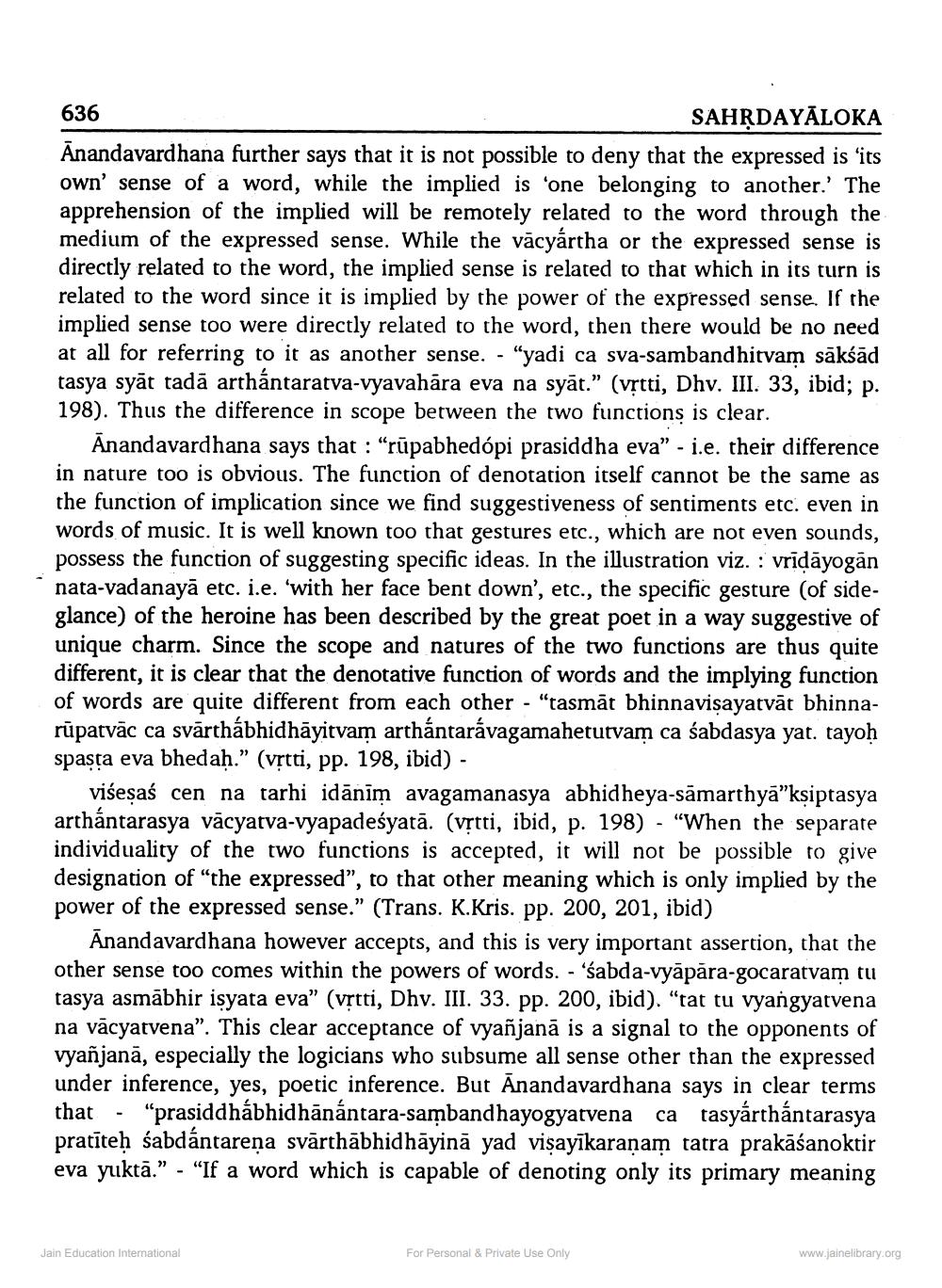________________
636
SAHRDAYĀLOKA Anandavardhana further says that it is not possible to deny that the expressed is 'its own' sense of a word, while the implied is 'one belonging to another.' The apprehension of the implied will be remotely related to the word through the medium of the expressed sense. While the vācyártha or the expressed sense is directly related to the word, the implied sense is related to that which in its turn is related to the word since it is implied by the power of the expressed sense. If the implied sense too were directly related to the word, then there would be no need at all for referring to it as another sense. - "yadi ca sva-sambandhitvam sākšād tasya syāt tadā arthántaratva-vyavahāra eva na syāt.” (vrtti, Dhv. III. 33, ibid; p. 198). Thus the difference in scope between the two functions is clear
Anandavardhana says that : "rūpabhedópi prasiddha eva” - i.e. their difference in nature too is obvious. The function of denotation itself cannot be the same as the function of implication since we find suggestiveness of sentiments etc. even in words of music. It is well known too that gestures etc., which are not even sounds, possess the function of suggesting specific ideas. In the illustration viz. : vridãyogan nata-vadanayā etc. i.e. 'with her face bent down', etc., the specific gesture (of sideglance) of the heroine has been described by the great poet in a way suggestive of
que charm. Since the scope and natures of the two functions are thus quite different, it is clear that the denotative function of words and the implying function of words are quite different from each other - "tasmāt bhinnavisayatvāt bhinnarūparvāc ca svārthábhidhāyitvam arthántarávagamahetutvam ca śabdasya yat. tayoh spasta eva bhedah.” (vrtti, pp. 198, ibid) -
višeșaś cen na tarhi idānīm avagamanasya abhidheya-sāmarthyā”kṣiptasya arthántarasya vācyatva-vyapadeśyatā. (vrtti, ibid, p. 198) - "When the separate individuality of the two functions is accepted, it will not be possible to give designation of “the expressed”, to that other meaning which is only implied by the power of the expressed sense." (Trans. K.Kris. pp. 200, 201, ibid) Anandavardhana however accepts, and this is very important assertion, that the
sense too comes within the powers of words. - 'śabda-vyāpăra-gocaratvam tu tasya asmābhir isyata eva” (vrtti, Dhv. III. 33. pp. 200, ibid). "tat tu vyangyatvena na vācyatvena". This clear acceptance of vyañjanā is a signal to the opponents of vyañjanā, especially the logicians who subsume all sense other than the expressed under inference, yes, poetic inference. But Anandavardhana says in clear terms that - "prasiddhábhidhānántara-sambandhayogyatvena ca tasyárthántarasya pratīteḥ śabdántareņa svārthābhidhāyin, yad visayīkaranam tatra prakāśanoktir eva yuktā.” - "If a word which is capable of denoting only its primary meaning
Jain Education International
For Personal & Private Use Only
www.jainelibrary.org




